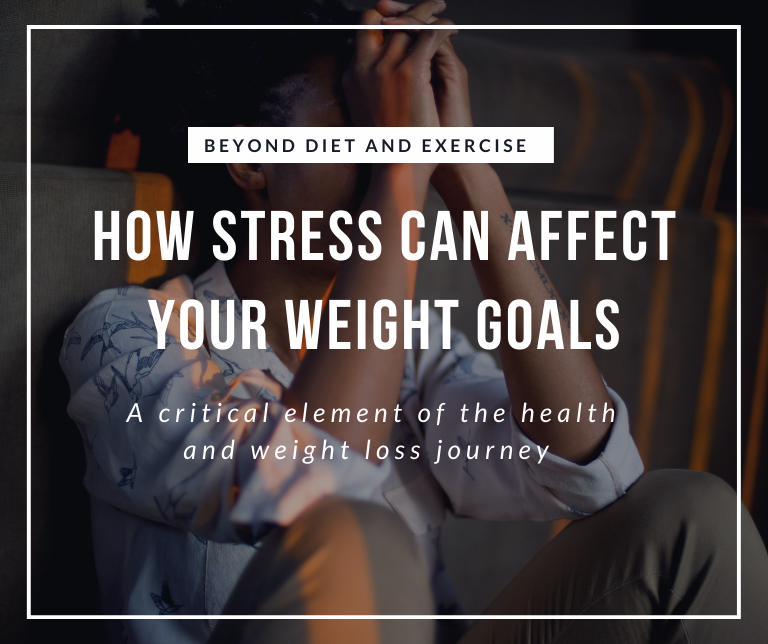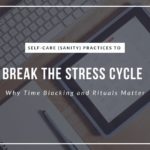When we’re talking about weight loss, usually we’re focused on diet and exercise. And while those things are important, they’re only part of the equation.
Stress doesn’t get a lot of attention, but it’s a critical element of the weight loss journey that just about everybody will have to deal with at some point.
Stress comes in many forms.
Work can be a huge source of stress, and many people find balancing the demands of family quite stressful too. Add in the pressures of a new diet and exercise routine, and your stress levels are gonna climb!
Stress has a direct impact on your physiological and mental processes, and it can often lead to self-sabotage. Here’s a common scenario many of my clients face:
You commit to a new diet or workout routine, and for the first week or two, everything goes great. Then something crazy goes down at work, or someone in the family gets sick, and the stress of it all makes it feel way too hard to stick with the new habits.
You tell yourself that you’ll come back to it in a couple of weeks when everything has settled down, and go back to your old habits.
This is why it’s so important to understand how stress impacts your weight loss journey. If you don’t plan for it, stress resets you to the default.
When you’re highly stressed, it’s hard to think straight. You lose the ability to really tune into what your body needs, or even to just take a pause to think about what you’re doing.
Let me be clear that this is not your fault. The human body is an incredible machine, but it hasn’t yet evolved to handle modern stress.
The Physiological Effects of Stress on Your Body
The sources of stress we face today are very different to what humans were facing millennia ago. We’re more likely to be stressed out by a constant stream of Slack messages at 9pm than to be chased by a saber-tooth tiger.
But our bodies can’t yet tell the difference, and so our stress response is often way out of proportion to the problem, and counterproductive in actually dealing with it.
This is your body on stress:
1. Stress raises your cortisol levels.
As studies have shown, cortisol directly limits your brain function. When it is released due to stress, sugars are shifted away from your brain to your muscles. This is your body’s natural response to stress — it gives your muscles the energy to run away!
Without the necessary energy in your brain, your memory and other cognitive functions can be affected. Forgetting about your workout after a tough workday could actually be explained by your body’s reaction to stress.
2. Stress reduces fat metabolism.
A randomized, double blind study on middle aged women found that those with a higher number of stressors had higher levels of insulin. There was also evidence that there was less fat oxidation in the stressed women, which aids in the breaking down of fat molecules in the body.
In practice, this means that stress is literally slowing down the rate at which your body metabolizes fat and is standing in the way of you and your weight loss goals.
3. Stress produces other physical problems.
Headaches, high blood pressure and less sleep. Although everyone reacts slightly differently, common symptoms of stress include more frequent headaches, high blood pressure and less sleep. None of these are conducive to losing weight and can lead you into unhealthy food choices as comfort, or demotivate you when it comes to exercise.
Pretty drastic, right?
And like I said, stress can also have a major impact on your mental processes — the most significant of which is self-sabotage.
What Is Self-Sabotage?
When you are under constant stress — which most high-performing people are — self-sabotage can really sneak up on you.
It shows up in those little choices that feel comfortable and familiar, even if that means going backwards on all the progress you’ve made.
The cycle I see most often is that when people aren’t managing their stress, they start to look for a rest or a reward for sticking to their nutrition and fitness plans.
They think, “I’ve hustled all week and I’ve been really good. I’ve dropped half an inch, so I deserve a treat.”
They want something that makes them feel good, fast, instead of taking the time to deal with the source of their stress — which would enable them to keep making consistent progress towards the goals they really want to achieve.
But that short-term reward can often lead to a negative spiral that makes it much harder to get back on the wagon.
It’s tough, but the fact is that rewarding yourself with food or taking that break, especially early on in your weight loss journey, is often detrimental long-term.
From what I’ve seen, self-sabotage is a mix of not feeling worthy of putting this much effort into yourself, and being afraid of really looking at yourself in the present.
It can be hard to acknowledge where you are right now. It can be demoralising to face how far you have to go. There’s a lot of fear of failure, too, and so many people would rather convince themselves that they could do it if they wanted to, but there’s some reason they’re not going to right now.
So if you catch yourself thinking, “I had a really great week on my new plan, so I deserve to have a big night out with the girls,” or, “I’m exhausted. I’ve cooked a lot this week, so I’m just going to order take-out tonight and play it by ear for the weekend”…
Ask yourself if that’s really in line with your goal.
If you’ve planned for an indulgence, then go for it! But check in to make sure it’s not actually just stress masquerading as a chance to treat yourself.
How To Break the Stress Cycle
The cravings and the highs you get from eating when you’re stressed can become very cyclical.
In order for your weight loss not to be affected by the stress that inevitably happens in life, one of the first things we need to do is break that cycle.
Every time you do indulge when you’re stressed, it feeds into that loop, which makes it that much harder to get out of it, both from a habit perspective and on a deeper physiological level.
Now, I get it: when you’re stressed or tired, and you know that eating that candy bar or muffin would give you the energy to keep going, it’s hard to take a step back and choose to do something else.
This requires energy, instead of giving you energy.
That’s why the first step to breaking this reliance is just to note your response. You’re not trying to change it right away, you’re just logging the situation.
I’m doing this with a client at the moment. Her work is crazy right now, so every time she reaches for her crutch food — which is chocolate — she just takes a picture and sends me a quick note explaining what’s going on.
There’s no judgement, we’re just observing the pattern.
And even after just a few days, she’s realised that this is a ‘thing’ that’s crept up on her and that needs to be dealt with.
We’re going to look at the root cause — why work is stressing her out so much — and see if we can slowly make some changes there that will make it easier for her to reduce her reliance on that chocolate bar every day.
Remember that we have to really reconfigure your default response to stress, so it’s OK to take it slow and steady.
The way we reconfigure those defaults is two-fold.
The first is to try to cultivate a growth mindset. You’re not going to be perfect all the time, so it’s key to be open to learning from what happens each day.
The second is to implement a time or a practice when you can simply just check in again and recommit to your goals and the process.
That might be with a person — me or someone else — or through a journal, or putting a weekly reflection time on your calendar, but take a few minutes each day or week to check in on whether your actions are actually working for the goals you’ve set for yourself.
How To Create a Stress Free Environment For Your Weight Loss Efforts
Let’s be honest: it’s impossible to eliminate all sources of stress from our lives. And I’d be remiss to say that you can simply work your way out of it as there are many instances in which you may want or need to reach out to a licensed mental health professional for support. However, there are plenty of things that are within your control and just a few changes to your daily habits can lead to lower levels of stress.
1. Manage work stress.
Of the major causes of stress, studies have found that your job is most likely to be the biggest cause. This has been broadly acknowledged by businesses and many companies do their best to reduce workplace stressors, but you need to take an active role.
Establish healthy boundaries between your work and personal life and don’t be afraid to get support or take time to recharge if your work related stress is getting out of control.
2. Meditation and relaxation
A great general remedy for all kinds of stress is meditation. Mindfulness meditation has been proven to reduce stress levels, and even make you a more forgiving person!
Even if you don’t have the time or inclination to meditate, you should definitely build relaxation time into your day. We are now constantly connected and it can be hard to switch off and truly wind down. Try and build in some time away from screens and other stimulation into your evening, especially right before you go to bed.
3. Sleep
Getting enough sleep is crucial to reducing your overall stress levels, not to mention your health in general. A very real problem is the sleep-stress cycle.
Studies have shown a link between increased stress levels and a lack of sleep, yet high levels of stress are also reported to result in people lying awake, unable to sleep. It is believed that this is linked to the cortisol released when your body is under stress.
There is evidence to suggest that sleeping in a hot room can result in elevated cortisol levels. So open a window or turn down the thermostat and get a good night’s sleep — it is one of the single easiest things you can do to reduce your stress levels.
4. Physical stress
Managing your physical stress is crucial, especially if you are just beginning a new training program. It is important not to push yourself too hard and build in recovery time.
Pushing yourself further when you really need to rest is counterproductive in terms of stress and can also lead to injuries that can set you back.
5. Eating and digestion
Eating too frequently, even when it is healthy food, results in extra stress on your digestive system and can be counterproductive to weight loss.
A great way to manage this is time restricted eating, which sees you limit your recommended calorie intake into clearly defined periods of the day.
It’s All Connected
Your body is a complex system that we still do not fully understand. Everything is connected when it comes to your health and weight loss.
Despite your best efforts, if you focus on ounces and pounds as the measure of your success, you are not likely to see long term changes to your health and well being.
Instead, aim to create new healthy habits, which include strategies for limiting stress and you will be rewarded with a healthier body and mind far into the future.
If you would like to explore partnering together to help break out of your own stress cycle, click here. Let’s connect so that you can make the progress you really want on your weight loss journey and start to feel healthy, confident and relaxed again.




